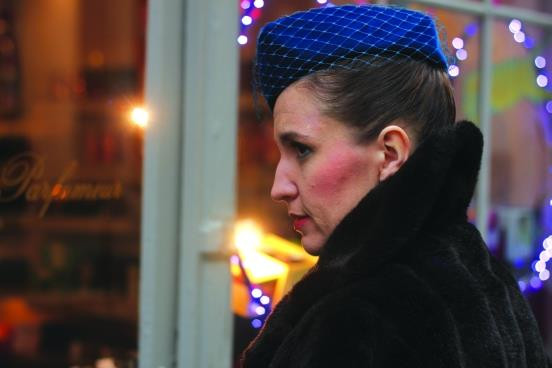Showing of Madame B
Sep 13, 2014
Second showing of the movie by Mieke Bal and Michelle Williams Gamaker.
- Price
- Entrance fee to the Stedelijk Museum + € 2.50
- Location
- Teijin auditorium, Stedelijk Museum Amsterdam
- Time
- Sep 13, 2014, 1.30 pm until 3 pm
- Main language
- English
- Admission
- It is necessary to make a reservation. Send an e-mail to reservations@stedelijk.nl, stating your full name, e-mail address, telephone number, and the date and time of the program you want to attend.
About Madame B:
Madame B, 2014 | 96' | Color | Mieke Bal & Michelle Williams Gamaker.
Genre: Drama.
Language: Finnish, French, Swedish, English; English subtitles
Madame B is a feature film about the entwinement of capitalism and romantic love. An update of Gustave Flaubert’s prophetic 1856 novel, Madame Bovary, , Madame B explores how dominant ideologies from the late-19th century are still rampant today – specifically, within the framework of patriarchy, capitalism and its investment in emotions, while love is for sale. Now, more than ever, both capitalism and romantic love, luring people with the contradictory expectation of permanent excitement, conspire to make individual lives difficult, disappointing, and at times ruinous.
The film’s starting point is a real event that took place in mid-19th century Normandy, France, but could also happen today. Drawing on Flaubert’s masterpiece in order to provide an allegory for contemporary mores, the film offers a radically new interpretation of the text, replete with powerful imagery and playing with anachronism: this is not a historical drama. The film’s starting points are based in historical reality, but at the heart of the story is the relationship this event has with today’s worldwide economic hardships, driven by a compulsion to (over)consume. The film uses different languages to highlight the universality of this situation.
The story is a familiar one. Living on a farm and attending school in a nearby town, young, talented Emma spends as much time as possible outdoors, far from the oppressive confines of the homestead. What she seeks most of all is an escape not just from the farm but to a life of glamour, passion, and freedom. Marrying Charles, a widowed doctor, seems a step up from the farm; but in everyday life he turns out to be boring. She seeks passion in a lover, then turns her attention to the allure of money and consumerism, spending lavish amounts on extravagant products. This consumer addiction will lead to her destruction, as ruinous debt results in the auctioning off of all her and her husband’s possessions. When Emma’s attempts to recoup the money or secure loans from businessmen, former friends, and lovers run cold, her needs turn to desperation. This can end in different ways – and in Madame B, it does!
About the artists:
Mieke Bal is widely known as a cultural theorist and critic, and the former (founding) director of the Amsterdam School for Cultural Analysis (ASCA). Her areas of interest range from biblical and classical antiquity to 17th century and contemporary art and modern literature, feminism, and migratory culture. Her many publications include A Mieke Bal Reader (2006), Travelling Concepts in the Humanities (2002), and Narratology (3rd edition 2009). Bal is also a video artist. Her internationally exhibited documentaries on migration include Separations, State of Suspension, Becoming Vera, and the installation Nothing is Missing, and are part of the Cinema Suitcase collective. With Michelle Williams Gamaker, she made the feature film A Long History of Madness, a theoretical fiction about madness, and related exhibitions (2012). Her current project Madame B: Explorations in Emotional Capitalism, also with Williams Gamaker, is exhibited worldwide. Occasionally, she acts as an independent curator. Her co-curated exhibition 2MOVE traveled to four countries.
Michelle Williams Gamaker is an artist and researcher. Her work deals broadly with performance and complex renderings of reality via documentary, fiction and video installations. A key aspect of her practice is the use of collaboration: she considers her work living research into meeting people and finding ways to record their stories. Williams Gamaker’s work also explores performance as physical research, as in her latest video Words in Movement (2014, with Berta Roth), Scaling Copan(2009) and Performance for Cows (2010), both with frequent collaborator Julia Kouneski (US). For over 10 years, together with Dutch artist and cultural theorist Mieke Bal (and their Cinema Suitcase collective), Williams Gamaker has completed several films and installations. Her latest project,Black Matter Earth is a post-colonial, post-romantic exploration of the female protagonists of British directors Powell & Pressburger. She works as a Fine Art Senior Lecturer with Kingston University, London, Gerrit Rietveld Academie and is an arts educator at Tate Britain.

